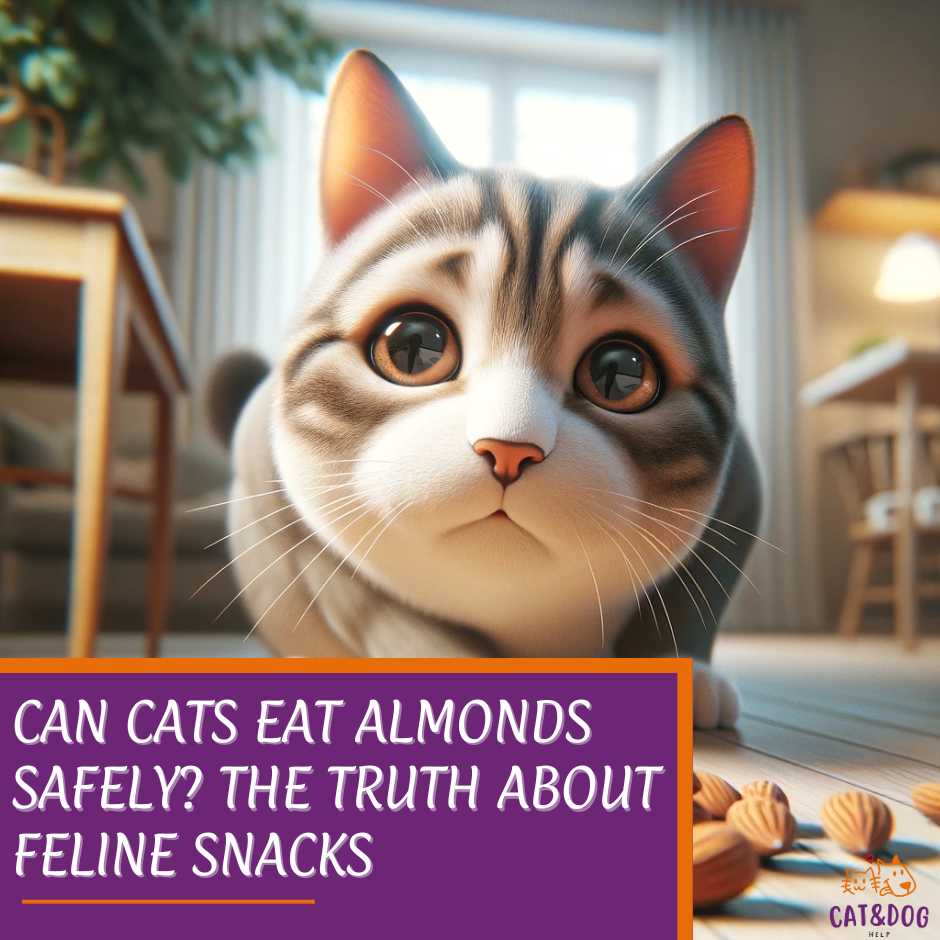Caring for your feline friend involves more than just cuddles and playtime; it’s crucial to be mindful of their diet, too. Cat lovers like you often ponder over the human foods that are safe for cats. (1)
So, let’s munch on a nutty question:
Can cats eat almonds? This might seem like a small concern, but with the increasing trend of sharing our snacks with our pets, it’s pretty important to get the scoop on what is safe and what is not.
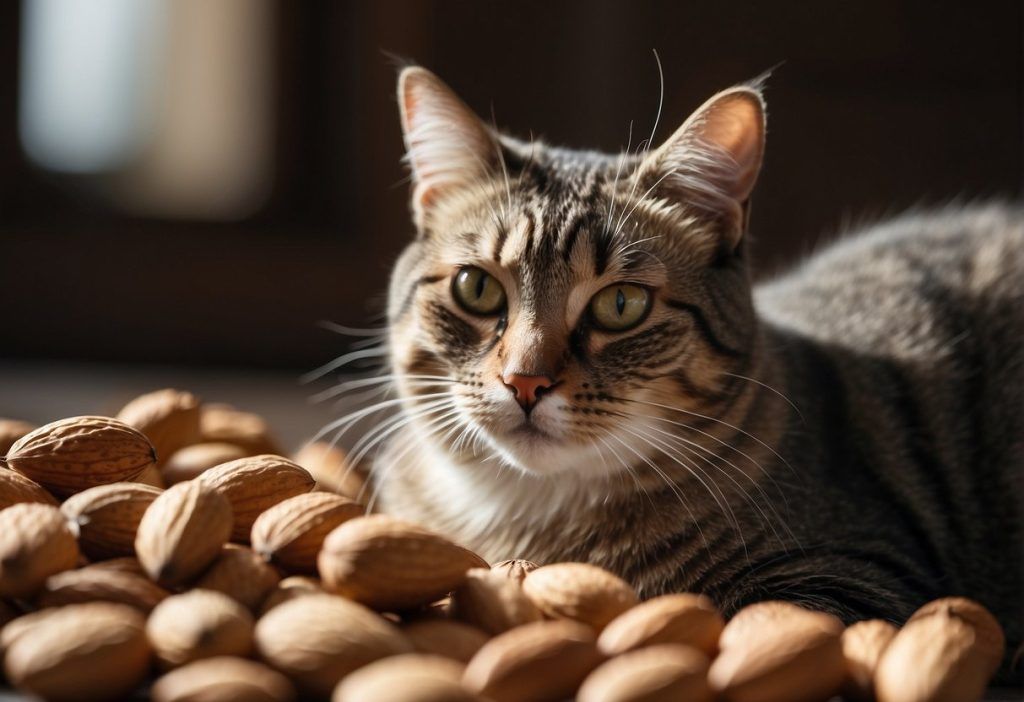
Almonds seem like a healthy and delicious snack for humans, loaded with proteins, healthy fats, and essential nutrients. Now, you may wonder if these nutritious nuts can be shared with your cat.
Before you open that bag of almonds, let’s have a look into this further. It’s a mixed bag of information out there, and we’re here to sort the nuts and bolts for you.
We promise to crack the case with expert opinions, backed by veterinary advice without driving you nuts with complicated jargon, ensuring your kitty stays healthy and happy.
Almonds could provide a valuable source of protein to your cat, and the unsaturated fats could keep their skin, fur, and joints healthy. (2)
The high fiber content in almonds could also help keep their stools moving and prevent gut problems like constipation and diarrhea.
However, it’s important to note that almonds are not recommended for cats as they are difficult for them to digest. Cats are carnivores and can’t properly process plant matter, including almonds, pecans, and other plant-based food.
Additionally, sweet almonds have a trace of cyanide in them, so if your cat eats too many, they can experience cyanide poisoning.
Although almonds are a beneficial and delicious snack for us, they aren’t something we should share with our pets. (3)
Key Takeaways
- While almonds are not toxic to cats, they’re not an advisable treat due to potential health risks to cat.
- Cats have specific dietary needs, so human foods like almonds don’t offer them significant nutritional benefits.
- Always consult with a vet when introducing new foods to your cat’s diet for tailored advice to your pet’s needs.
Nutritional Analysis of Almonds
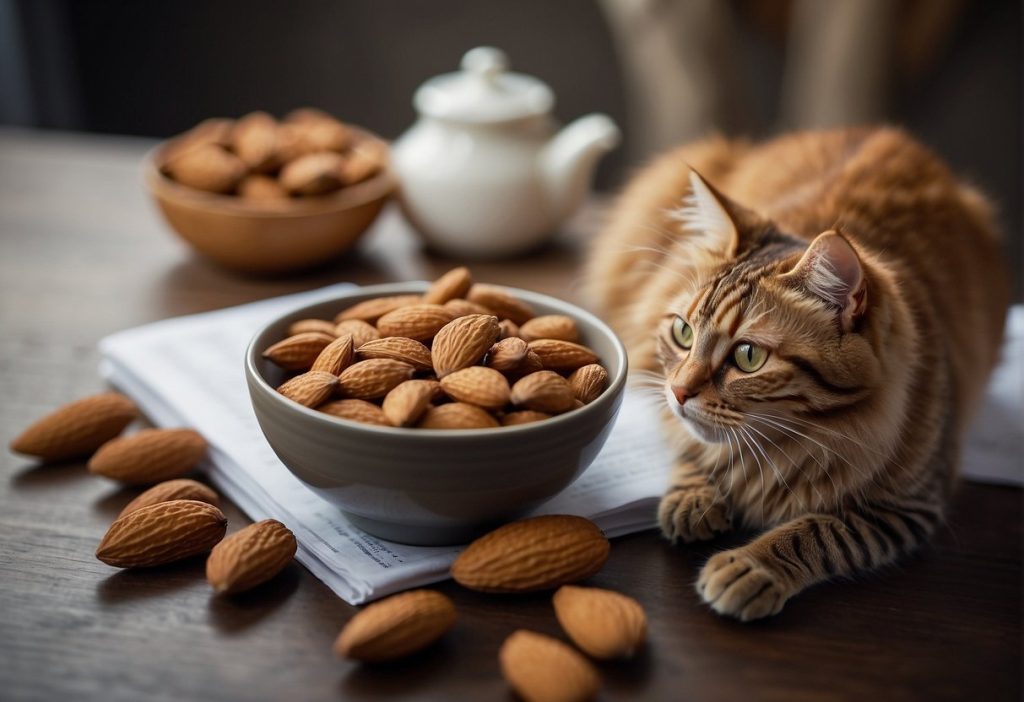
Have you ever wondered what’s inside those crunchy, tasty almonds you love to snack on?
Let’s crack them open! Almonds boast a variety of nutrients that are fantastic for humans, but how do they measure up to your feline friend?
- Protein: Essential for kitty muscle maintenance, almonds have it, but your furball gets plenty from their meat-based diet.
- Fats: Almonds are rich in healthy fats like omega fatty acids. While cats need fat, they require animal-based sources for optimal health. (4)
- Vitamins: Almonds come packed with vitamin E and magnesium. Good news, right? However, cats have unique vitamin needs like vitamin A and taurine, which almonds don’t provide.
Now, let’s sprinkle in some stats. Almonds contain about 21 grams of protein and 50 grams of fat per 100-gram serving.
That’s a lot of fat! And while these numbers might pique your curiosity about almonds for your cat, let’s paws and consider their diet.
Our feline pals are obligate carnivores, meaning their bodies are tuned to meat.
Are any of these almond ingredients beneficial for cats? In moderation, some might argue that a tiny bit won’t hurt.
But, here’s the scoop from the vet’s corner: the benefits are quite limited due to how cats process nutrients.
In short, while you might find almonds a-mew-zing, your kitty’s nutritional needs are better met by their regular, meaty fare. Have you ever seen a cat munching on almonds in the wild?
Exactly! Stick to the diet made for the perfect predator, and leave the almonds for your own snack bowl.
I had a toothless cat on a raw diet like this and for her, I used a hammer or the blunt back of a cleaver to smash bones up small enough that she could swallow them whole.
Sometimes I’d smash them so much they made a paste with the meat in them. Other organs provide other nutrients that meat does not, and the more variety, the better.
The spleen is often pretty easy to get, (for me at least), kidneys are easy to get, lungs are fine if you can find them but very spongy and a bit of a pain to cut up.
Brains are a great source of Omega 3s if you can find them and if the cat will eat them. Additionally, brains are a great source of Omega 3s if you can find them and if the cat will eat them.
Risks and Concerns
Hey there, have you ever wondered if those crunchy almonds you love are safe for your furry friend? Let’s dive into why sharing your snack might not be the best idea.
First off, almonds can cause digestive issues in cats. Their bodies aren’t designed to process high-fat, non-meat foods.
Digestive Concerns:
- Almonds are high in fats that cats cannot easily digest.
- They can lead to upset stomachs, vomiting, or diarrhea.
Concerned about more than an upset tummy? Well, there’s also the risk of choking or intestinal blockage, especially in smaller cats or kittens, due to almonds’ tough shell and size.
And let’s not forget obesity and pancreatitis, as these nuts pack quite the caloric punch. (5)
Did You Know?
| Potential Health Issue | Cause | Symptom |
| Obesity | High calories | Weight gain |
| Pancreatitis | High fat | Abdominal pain |
Now, about those types of almonds – bitter almonds may contain traces of hydrogen cyanide, a nasty toxin called cyanogenic glycosides.
While sweet almonds are generally less harmful, it’s better to err on the side of caution.
If you think your cat’s snagged an almond, watch out for symptoms like difficulty breathing, muscle tremors, weakness, or symptoms of cyanide poisoning such as dilated pupils, an upset stomach, or hyperventilation.
Remember, no significant stats on almond-related incidents in cats have been reported, but why take the chance, right? Play it safe and keep those almonds meant for human consumption to yourself.
In summary, the simple answer is that while a tiny nibble may not send your cat to the vet, regular almond indulgences, especially those meant for human consumption, are a definite no-go.
Keep those kitty treats almond-free!
Safe Dietary Practices for Cats
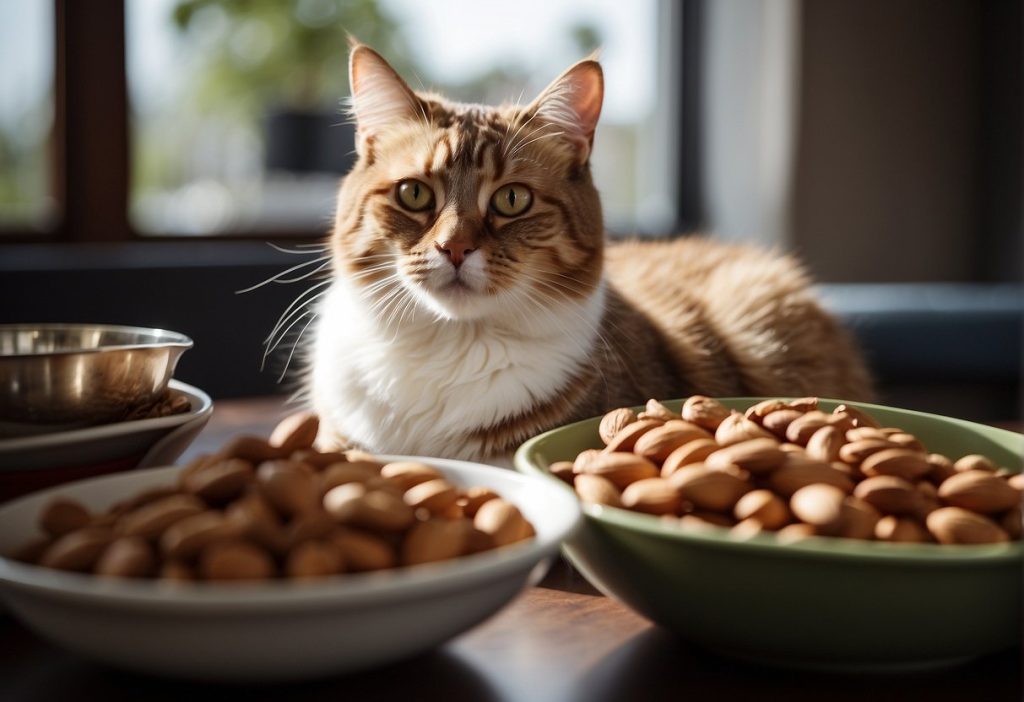
Ever wondered what treats you can safely give to your curious feline friend besides their usual fare? Let’s get into some paws-itively good advice about safe snacking for your kitty!
To ensure your cat enjoys healthy cat snacking, always choose treats that are specifically formulated for their dietary needs, steering clear of human snacks like almonds.
Alternatives to Almonds:
While you might adore munching on almonds, these nuts aren’t the best snack for your cat. But don’t worry, there are plenty of cat-friendly alternatives!
- Cooked Meat: Chicken or turkey, free of any sauces or seasoning, is a great choice.
- Fish: Occasionally offering small amounts of cooked fish can be a treat for your cat.
- Catnip: Also known as kitty salad, catnip is both safe and fun for cats.
- Commercial Cat Treats: These are formulated specifically for cats and are the safest option.
Always remember, treats should never make up more than 10% of your cat’s diet!
Guidelines for Introducing New Foods:
Introducing new foods to your cat can be like navigating a fun-filled obstacle course. Here’s how to do it without causing a kitty uproar:
- Go Slow: Introduce any new food gradually by mixing it with their current food.
- Watch for Reactions: Keep an eye out for any signs of digestive upset or allergies.
- Tiny Portions: We’re talking about a taste, not a full-course meal.
- Follow-up: Observe your cat’s behavior and stool over the next 24 hours.
Mixing the new food in small amounts with the old food can help ensure your cat doesn’t turn up their nose at the novel offering. Cats can be finicky, so patience is key!
By keeping these tasty tips and steps in mind, you ensure your cat stays both happy and healthy. Now go ahead, be the purr-fect pet parent, and get tail wags of approval from your feline food critic!
Expert Opinions and Veterinary Advice on Can Cats Eat Almonds
Have you ever wondered if your furry friend can nibble on almonds just like you? It’s a question that might have tickled your curiosity. Let’s see what the veterinary experts say about it.
The consensus among vets is that, while almonds aren’t toxic to cats, they’re not an ideal snack.
According to the ASPCA, sweet almonds don’t pose a direct toxin threat, but that’s not a green light to start a feline-almond feast. Let’s crunch into the details:
- Nutritional Mismatch: Cats are obligate carnivores, meaning their bodies are fine-tuned for meat, not almonds. Nuts don’t offer the protein kick your cat craves.
- Digestive Woes: Almonds can be tough on your kitty’s tummy, occasionally leading to upset stomachs or pancreatitis due to their high-fat content.
In a quirky twist, the veterinary community stumbled upon a surprising find. A Purina survey revealed some cats show more energy after eating almonds.
It’s a curious reaction, not a rule of paws, and not worth risking your furball’s health.
But here’s a twist in the tail—bitter almonds are dangerous, containing cyanide compounds which could lead to poisoning. That’s one snack to strike off the kitty menu pronto!
So what if you catch your cat paw-deep in an almond stash? Here’s what you need to do:
- Calmly remove the almonds and give your whiskered pal something more appropriate to chew on.
- Keep an eye on their behavior and any signs of discomfort.
- If things seem off, reach out to your vet for advice. Better safe than sorry, right?
Remember, moderation is key, and almonds should never replace a proper cat diet. It’s like you enjoying a rare candy bar—fun but not frequent!
Addressing the Gaps in Existing Content
Cats and almonds: Are they a good match? Spoiler alert: it’s not a straightforward yes or no.
Some experts suggest that, as a general rule, feeding cats almonds in small quantities as an occasional treat could be harmless. But hang on, let’s dig into the meat of the matter—or should we say the nut butter?
You may find that some cats don’t like eating almonds; however, if you try them out on your feline family member first, then make sure not to give too much at once so that they don’t become sick from consuming too much nut butter/oil, canned foods such as spam, sardines, etc.
.
Diverse Perspectives:
- Nutrition Expert A: “Cats can handle a few almonds, though they aren’t your best bet for treats.”
- Nutrition Expert B: “Absolutely not. Almonds can cause gastrointestinal upset in cats.”
User Experiences:
- Cat Owner 1: “Tried giving my cat an almond once—she turned up her nose.”
- Cat Owner 2: “My cat snatched an almond, and next thing we knew, we were at the vet.”
Detailed Alternatives:
- Cooked chicken (high in protein)
- Scrambled eggs (vitamin-rich)
- Cooked carrot slices (fiber-loaded)
Let’s face it, your feline friend craves variety. Here’s a quick nutritional breakdown:
| Alternative | Protein | Vitamins | Fiber |
| Chicken | High | Various | None |
| Eggs | Moderate | A, B2, B12 | None |
| Carrots | None | A, K | High |
Interactive Elements:
- Quiz: “What’s Safe for Snacking?” Test your knowledge of feline-friendly foods.
- Infographic: “The Cat’s Meow in Meals” showcasing optimal cat diets.
Emergency Care:
- If your cat seems off after an almond, watch for trouble signs: lethargy or stomach upset.
- Unsure? Better safe than sorry—ring up your vet!
Remember, it’s not just about a happy cat, but a healthy one. When in doubt, opt for a vet-recommended treatment over a nutty gamble.
Keep these kernels of wisdom handy—your cat will thank you with purrs aplenty.
Additional Resources
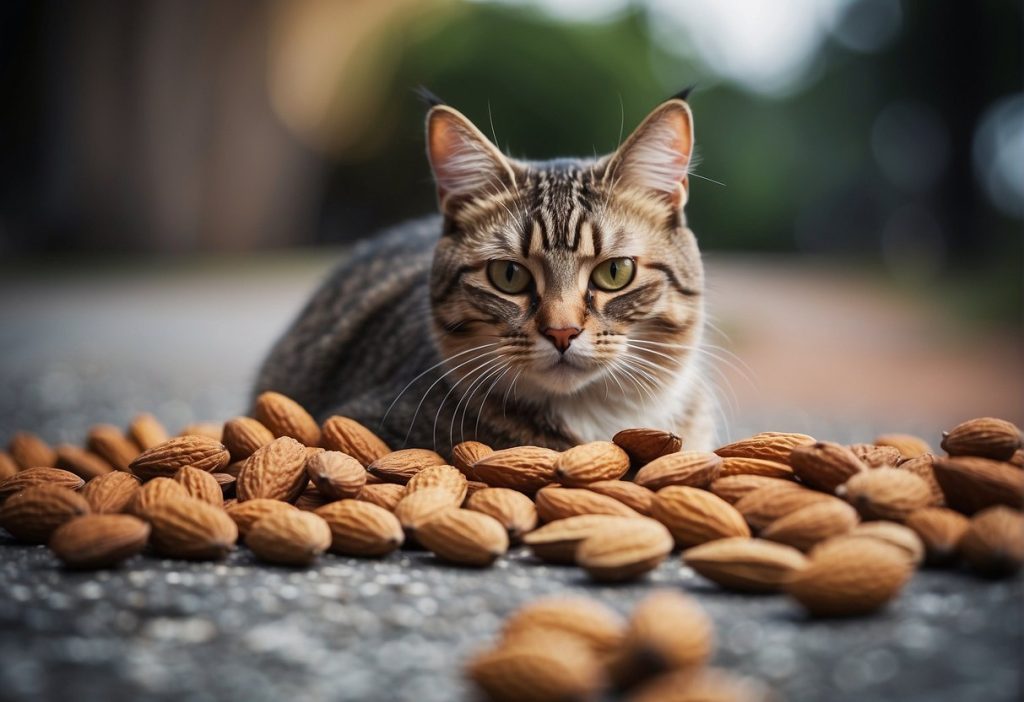
Hey there, cat enthusiasts! Want to dive deeper into the almond-going-ons of your feline friend’s diet? Here’s the scoop you need, without the fluff:
Authoritative Sources:
- ASPCA Poison Control Center: Your go-to for a comprehensive list of foods that are risky for pets. Visit ASPCA
- PetMD: Offers detailed articles on cat nutrition and potential dangers. Check out PetMD
Nutritional Studies:
- Journal of Feline Medicine and Surgery: For scholarly articles detailing the intricacies of feline diets. Explore JFMS
- Veterinary Centers: Many have online publications about pet health, including nut ingestion. Contact your local vet for specifics!
Related Articles for Casual Reading:
- Curiosity and the Cat: An article about the different dietary needs and restrictions for our kitty pals.
- To Snack or Not to Snack: This piece examines the snack habits of domestic cats, with a focus on current research.
Feline Nutrition Forums:
- TheCatSite.com: A thriving community where you can chat about all things cat nutrition. Join the discussion
Remember, you’re making decisions for a feline’s life, so let’s make them informed ones! If you’ve stumbled upon any doubts or anxieties along the way, these internet resources are your trusty sidekicks.
And remember, nothing beats a good ol’ chat with your trusted vet. Happy reading, and give your kitty an extra little scratch behind the ears from us! 🐾
Quick Recap
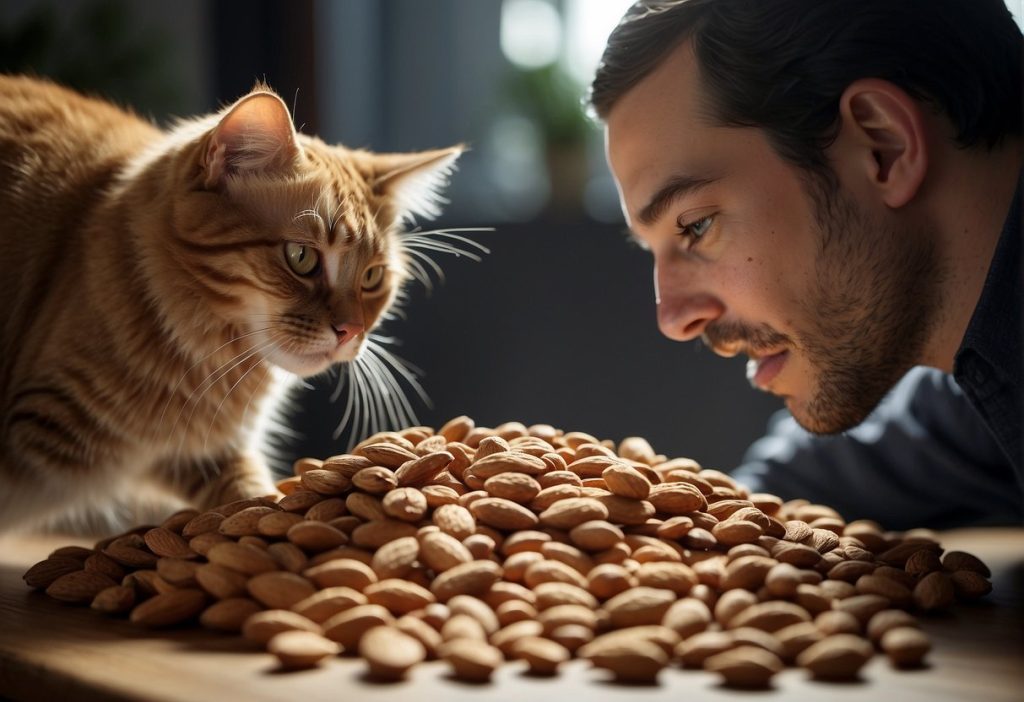
Hey there, let’s quickly look at what we’ve learned about cats and almonds. Feeling nutty about giving your kitty a taste of almonds? Hold that thought!
Are Almonds Safe for Cats?
- Sweet almonds: Not toxic to cats
- Ideal frequency: Occasional treat
- Quantity: Very small amounts
Potential Risks
- Digestive issues: Cats have a shorter digestive tract, making almonds tough to digest.
- Nutrient absorption: The good stuff in almonds for humans doesn’t benefit cats much.
Nutritional Perspective
| Nutrients in Almonds | Useful for Cats? |
| Healthy fats, vitamins, minerals | Not particularly |
| Control blood sugar, blood pressure | Designed for humans |
The Takeaway
- Almonds aren’t inherently poisonous to your feline friend, but they’re far from the perfect snack.
- A tiny nibble won’t hurt, but almonds should never be a regular part of your cat’s diet.
So, what’s the verdict? While you crunch on your almonds, maybe toss a catnip toy instead of an almond to your kitty companion! They’ll appreciate the play far more than a nut they can’t properly enjoy.
Keep it safe and stick with treats made for cats. Your furry pal will thank you with purrs and cuddles!
Frequently Asked Questions
When it comes to your curious kitty and almonds, you’ve got questions, and we’ve got answers. Let’s crack open the shell on this topic and get straight to the point.
What risks are associated with feeding cats almond-based products?
Almond-based products are not ideal for cats. They can cause digestive upset and are not nutritionally suitable for your feline’s diet.
Your cat’s short digestive tract isn’t designed to process nuts like almonds, which can lead to complications.
Are there any nut varieties that are safe for cat consumption?
Most nuts, including almonds, are not recommended for cats. They are high in fats and oils that can cause stomach upset or even pancreatitis in cats.
Thus, it’s best to stick to cat-specific treats that are formulated for their dietary needs.
Is the occasional consumption of almond milk harmful to cats?
Almond milk lacks the nutritional value cats require and can sometimes contain additives that are bad for felines.
While a small lick might not harm your cat, it’s best to avoid making it a regular part of their diet.
How do typical feline digestive systems react to eating nuts like almonds?
Cats’ digestive systems are not designed to handle nuts.
Almonds can cause gastrointestinal distress, including vomiting and diarrhea, so it’s wise to keep these out of paw’s reach.
Can the ingestion of almonds lead to health emergencies in cats?
Almonds themselves aren’t considered toxic to cats, but the side effects from eating them, like choking or an upset stomach, might necessitate a vet visit.
Monitor your cat closely if they snag an almond.
What should a pet owner do if their cat accidentally eats an almond?
If you catch your cat snacking on an almond, observe them for signs of discomfort.
While a single almond may not require a trip to the vet, contact your veterinarian if you notice any health changes.
What are the long-term effects of almond consumption in cats?
Regularly feeding your cat almonds can lead to digestive issues and potentially contribute to weight gain or pancreatitis due to the high-fat content.
It’s a no-go for maintaining your kitty’s long-term health. Stick to vet-recommended cat food for a happy, healthy pet.
- Ideal Casinos Mobile: The Ultimate Guide to Mobile Betting - July 26, 2025
- The Ultimate Overview to Casino Site Gamings Online - July 26, 2025
- How to Get the Most Out of Online Casino No Deposit Bonuses - July 26, 2025

